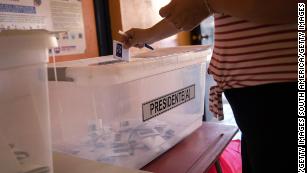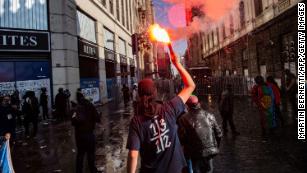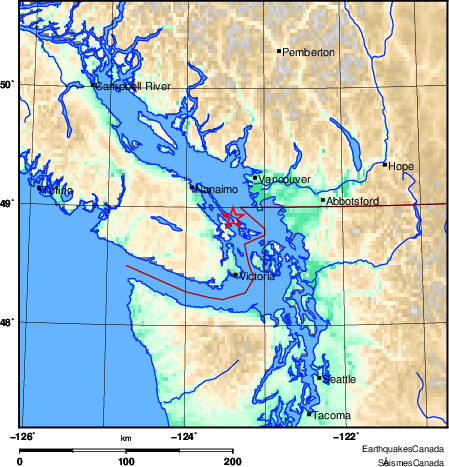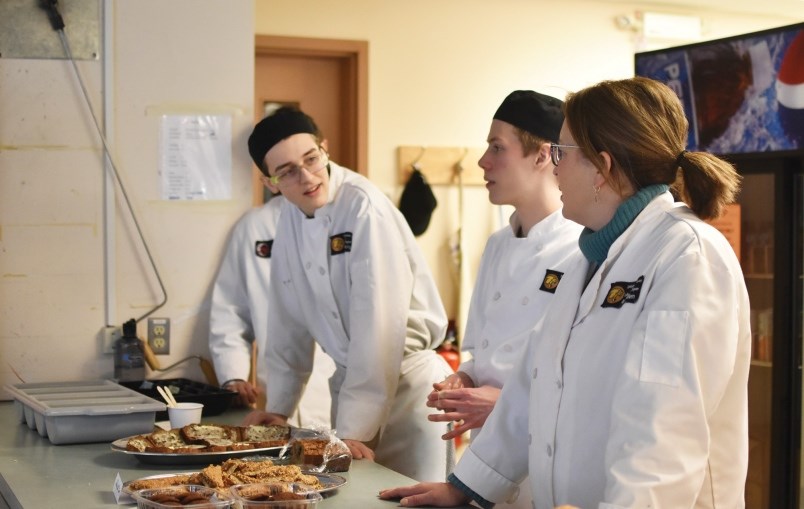Author of the article:
Natalia A. Ramos Miranda
Publishing date:Dec 18, 2021
SANTIAGO — Chilean leftist Gabriel Boric has widened his lead in the final polls ahead of the Andean country’s presidential election on Sunday, though the polarized race remains tight against ultra-conservative rival Jose Antonio Kast.
Ahead of the run-off ballot, two private polls seen by Reuters showed 35-year-old former student protest leader Boric edging ahead of Kast, 55, a far-right lawyer who has defended the legacy of military dictator Augusto Pinochet.
Chile, the world’s top copper producer and long a role model of market-oriented economic policy in Latin America, is set for its most divisive presidential ballot in decades, with both candidates from outside the centrist mainstream parties.
A private poll from Cadem, which surveyed 1,007 people with a margin of error of 3.1%, showed Boric taking 55% of the vote versus 45% for Kast, widening his lead over the last week when a similar poll showed him with 52% versus 48% for Kast.
A second poll by consulting firm Atlas Intel, which had shown a draw earlier in the week, now put Boric ahead with 51% voting preferences versus 49% for Kast. The survey included 4,062 people with a margin of error of 1%.
The country is in a two-week blackout period where pollsters cannot openly publish surveys on the vote, but private polls are often commissioned.
The first opinion polls after the Nov. 21 first round vote had favored Boric, though that lead had appeared to be narrowing until the most recent surveys.
(Reporting by Natalia Ramos; Editing by Adam Jourdan and Diane Craft)
From student protester to leftist hero: Meet the shaggy-haired millennial vying for Chile's presidency
By Daniela Mohor W., for CNN
Fri December 17, 2021
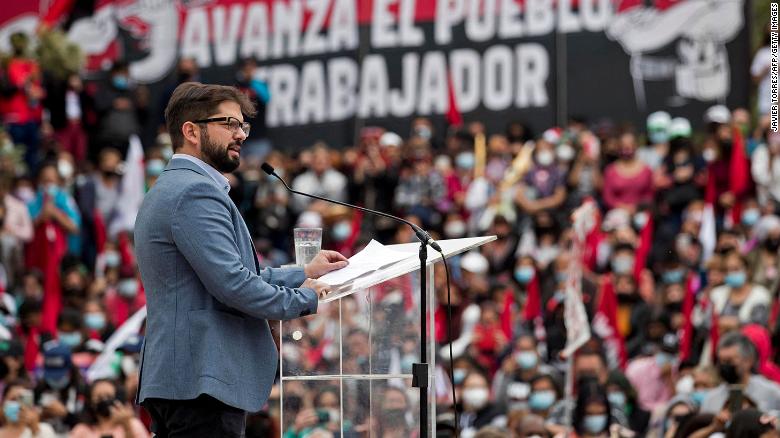
Chilean presidential candidate Gabriel Boric speaks to supporters during a political rally in Santiago, Chile on December 11, 2021.
(CNN)Just ten years ago, Gabriel Boric was a student leader in the Chilean capital, rallying against the country's privatized education system alongside thousands of other students in Santiago.
Now, the 35-year-old progressive congressman is taking that ethos to the polls, where he hopes to stave off his rival, far-right candidate Jose Antonio Kast, in the second round of the presidential election.
If he wins the run-off vote, Boric will become the country's youngest -- and most left-leaning -- president in its modern history.
Boric is running on a broad coalition ticket that includes the Communist Party and champions a welfare state model that promises to tackle the country's rising inequality. Last month, in the first round of votes, he won nearly 26% of the ballot share.
Meanwhile, Kast, a staunch defender of former dictator General Augusto Pinochet's regime and the free-market, garnered 28% of votes in the first round. The 55-year-old former congressman's agenda includes a tax cut for companies, building barriers in the north of Chile to prevent migrants from entering illegally and abolishing abortion, among others.

Chilean presidential candidates Gabriel Boric (right) and Jose Kast pose before a debate in Santiago, Chile on December 10.
For his critics, Boric is radical and inexperienced. But those qualities are also driving his popularity among young Chileans, many of whom came to know him during the last two years of social unrest.
In October 2019, massive protests shook the country as thousands demonstrated for better pensions, better education, and the end of an economic system that they believe favors the elite. Boric quickly became the most vocal representative of this social movement and boosted his leadership by rejecting the legacy of the center-left coalition that governed from 1990 to 2010.
That movement led to outgoing President Sebastian Pinera to agree to a referendum to change the constitution, which was inherited from Pinochet´s bloody dictatorship. Last year, Chileans overwhelmingly voted to draft a new one. That process is in now in the works, with the new constitution to be voted on in a new plebiscite sometime in mid-2022.
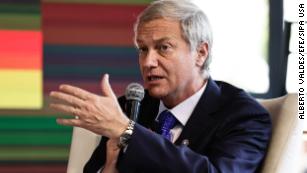
Make Chile great again? Meet the far-right presidential candidate tempting voters from Chile's left and center
Boric's political platform has been riding on that wave, which includes proposals for a more inclusive public health system, to cancel student debt, to raise taxes for the super wealthy and a revision of the state's private pension system -- which was inherited from Pinochet's military regime.
Sociologist and communication strategist Eugenio Tironi told CNN that Boric's policies are ticking all the boxes for millennials.
"His vision connects with this century's agenda: Climate change, feminism, decentralization, green economy, diversity, and direct democracy," Tironi said.
And he's polling extremely well in that age group.
Pablo Argote, a researcher of political science at Columbia University told CNN that Boric is overrepresented by voters 35 and under, and polling particularly well among those under 25.
"He embodies changes better than other candidates," Argote said.
"In politics, the intensity of the preference matters, the fact that people feel very excited about a candidate matters. And Boric has that," he added.
Responding to a generation
Born in 1986 to an educated middle-class family in the country's southernmost Punta Arena region, Boric attended one of the most elite private schools there before studying law at the University of Chile in Santiago. He didn't graduate but it took his interest in activism to new heights.
In 2011, he became one of the main leaders of a historic student movement demanding free education for all, which eventually led to a wide educational reform. In 2013, he was elected to Congress, and in 2016, he started his own political party, the Autonomist Movement.
Boric has long presented himself as an outsider and has been prone to reach agreements with other political sectors, even if it means making waves in his own coalition.

Gabriel Boric arrives for a presidential debate in Santiago, Chile on December 10.
Far from Pinera's more buttoned-up and pragmatic style, Boric is perceived as an emotional leader: He has publicly disclosed that he suffers from obsessive-compulsive disorder and spent two weeks in a psychiatric hospital.
He also makes it a point to own his mistakes -- and to apologize for them publicly. Although more traditional voters see this as a weakness, Tironi says it has helped him gain momentum.
"Part of his charisma is his tendency to go forward and then move back, to be keen to rectify and apologize. He is like a gamer. If things don't go in the direction he thought, he resets," Tironi said.
"That is attractive to an important segment of voters, above all the young," he added.
Supporter Tomas Diaz, a 32-year-old entrepreneur with a sustainable biking business, said that he says has admired Boric's leadership style since his days as a student protestor.
"He is open and respects agreements -- and that's what we need. He responds to my generation's way of seeing the world and cares about the environment," he said.
"He also represents me because I believe the state must be like a mother who protects all citizens -- and that anyone can do whatever they like with their private lives," Diaz said, taking a swipe at Kast's conservative social agenda.
Diaz added that Boric's policies, which also include the promotion of women's rights, LGBTQ+ rights and the environment, speak to him -- unlike candidates from his parents' generation.
"We are a generation of immediacy, and we don't want to wait like our parents did. We want changes and we want them now," he said.
But it is just that attitude that makes some voters sceptical of Boric's policies, with many fearing that attempts to dramatically transform the country while it is already in the middle of drafting of a new Constitution could push foreign investors away and put additional strain on the economy.
Economist Raphael Bergoeing, who is also the president of Chile´s National Productivity Commission told CNN that many of Boric's policies "go in the right direction, but I am afraid that it will act as a brake on investment and make things harder for everyone."
"Trying to do too many things in a short amount of time is the best recipe to do very little," he said.
The middle ground
Boric also faces another challenge: Getting moderates to embrace his alliance with the Communist Party, particularly around his take on the country's private pension scheme.
Earlier this month, Boric voted on a measure proposed by a group of representatives to withdraw more funds from state's private pension, despite his advisors warning him that it was bad policy. The policy is aimed to deliver financial assistance to Chile's poorest populations throughout the pandemic. However, economists argue that it is having a negative impact on the country's financial system and will increase inflation. Boric and his coalition's persistence to keep the initiative alive is viewed by critics as an attempt by more radical political groups -- Communists included -- to scrap the private pension system all together.
Boric's supporters see the private pension scheme as a marker of the country's widening inequality, while others view it as the foundation of Chile's strong economic market.
Kast is taking advantage of Boric's association with the Communist party by activating "the fear of having a situation like Venezuela," Tironi said. "But I believe Boric is more like Greta Thunberg than Fidel Castro," he added.
Still, Boric has softened his tone in the lead up to this weekend's vote to draw in the middle, saying that his proposals would be implanted gradually, that he believes in private property and in alliances between the private and public sector.
He's also brought in center-leaning economists to his team in an attempt to win over those moderate voters. And this week, he met with former president and UN High Commissioner for Human Rights Michelle Bachelet, who has officially endorsed him.
"He's been smart toning down his language, lowering expectations, and now presenting himself as the continuation of the trajectory of change previously proposed by the center-left coalition he used to criticize," Argote said, adding: "He still faces many challenges and may have conflicts within his coalition if he gets elected, but for now, I believe he has a good chance to win."
Change, freedom, order: Chilean dreams differ ahead of historic vote
Natalia A. Ramos Miranda
Publishing date: Dec 18, 2021 •
SANTIAGO — Chilean voters are split on what they want from the future ahead of a landmark presidential election on Sunday between polarized candidates – one offering social change and the other pledging to get tough on law and order.
The election will see ultra-conservative Jose Antonio Kast https://www.reuters.com/world/americas/chiles-kast-channels-pinochets-ghost-against-communist-left-2021-12-15
“What is at stake now in Chile is democracy itself,” said housewife Julia Acevedo, 80, who attended 35-year-old Boric’s closing campaign in the capital. “The country needs change and he, who is young, can make a difference.”
Kast supporters, on the other hand, want stability. They say Boric – who has taken aim at Chile’s market-oriented economic model for stoking inequality – will undo decades of growth and stability and criticize his alliance with the Communist Party.
“I will keep supporting freedom,” said Margarita Noguera, waving a Chilean flag stamped with a picture of 55-year-old Kast. She said she had lived through the “leftist dictatorship” of democratically-elected socialist president Salvador Allende in the 1970s.
“I suffered a lot, like so many other Chileans.”
Angela Marambio, 53, said she had backed a center-right candidate in the first round in November, but was switching her vote to Kast for the run-off.
“Chile needs stability, order and security,” she said.
‘POVERTY LINE’
Kast, a lawyer and religious father of nine, has defended the economic legacy of dictator Augusto Pinochet, whose bloody military rule from 1973-1990 overthrew Allende in a coup and established the country’s economic model.
Huge protests erupted in 2019 against that model, which many see as the reason for issues ranging from meager private pensions to expensive healthcare and education.
Cristian Morales, 51, a public official from Punta Arenas in Chile’s southern tip, Boric’s home region, said the leftist candidate could finally change things.
“I do not believe he will be able to make all the changes that are needed, but he will accelerate the process,” said Morales, citing plans for spending on pensions and education.
“If I were to retire tomorrow I’d fall under the poverty line. I have two young children, education is expensive. If we want more solidarity in society, the state has to get involved.”
Boric, who made his name leading student demonstrations for better quality education, has sought to channel the energy and demand for change sparked by Chile’s 2019 protests.
Kast has done the opposite, with a tough law and order message that has appealed to a significant segment of the country weary of protests.
Enrique Zuleta, 41, a businessman from the coastal city of La Serena, said for years he voted for the center-left coalition that governed much of the post-dictatorship period and gave Chile a reputation for stability. Now he is backing Kast.
“I did not grow up in a right-wing environment at all, but today my vote is pragmatic, for the national good,” he said.
“Kast has many ideological issues with which I do not agree. But… he has said that he will respect the laws. And that is important to me.”
Boric supporters say he will defend issues such as women’s rights to abortion – allowed only in certain circumstances – and will respect sexual diversity, in focus after the country this month approved https://www.reuters.com/world/americas/love-is-love-chile-legalizes-same-sex-marriage-historic-vote-2021-12-07 same-sex marriage.
Kast has criticized both abortion and gay marriage.
Polls indicate women, especially younger women, are more likely to vote for Boric.
“I am afraid of Kast,” said Andrea Ramirez, a 26-year-old public administrator. “He worries me about the environment, the role of the state, the pensions of Chileans. And what rights will women have?” (Reporting by Natalia Ramos; Editing by Adam Jourdan and Rosalba O’Brien)
'The coup destroyed us': Memories of Pinochet resonate in Chile's crossroads election
Anthony Esposito
Publishing date:Dec 17, 2021
SANTIAGO — Chilean Mireya Garcia, 64, feels there is more at stake than usual in this Sunday’s presidential election.
The vote offers two visions for the future of Chile – 35-year-old leftist Gabriel Boric https://www.reuters.com/world/americas/student-leader-president-chiles-boric-eyes-historic-election-win-2021-12-15, who led mass protests as a university student, will go head to head with far-right lawyer Jose Antonio Kast https://www.reuters.com/world/americas/chiles-kast-channels-pinochets-ghost-against-communist-left-2021-12-15, who has defended the complex legacy of former dictator General Augusto Pinochet.
For Garcia and many of her generation, this, the most polarized of Chile’s elections since its return to democracy in 1990, has opened old wounds.
Garcia’s brother was forcibly disappeared in 1977 during the dictatorship and Kast’s praise of Pinochet has angered her.
“The coup totally destroyed our family and we were never the same,” Garcia told Reuters.
“This has unexpectedly turned into one of the most closely-fought elections and what is at stake is that on the one hand the extreme right is clearly a danger for Chile and on the other hand, there is a candidate who represents the youth,” said Garcia.
Older Chileans lived through the tumultuous years of socialist President Salvador Allende, the 1973 coup that ousted him and ended his life, and the bloody 17-year military dictatorship that followed.
Since the dictatorship ended, Chilean elections have generally pitted moderate leftists against center-right candidates. The country has been known as an island of stability and orthodox policies in Latin America.
Now the old, deep divisions between the socialist left and far-right seem to be resurfacing.
Kast has praised Pinochet’s market-oriented “economic legacy” and appealed to voters with proposals seemingly taken from the playbook of right-wing populist leaders like Brazil’s Jair Bolsonaro https://www.reuters.com/world/americas/chiles-bosolonaro-hard-right-kast-rises-targeting-crime-violence-2021-11-22 and former U.S. President Donald Trump, such as building a ditch to curb illegal immigration.
On Thursday night, Kast promised thousands of supporters at a rally that he would bring order, after protests in 2019 saw buildings around capital Santiago burned and thousands injured in conflicts with the police.
“Chile is not and will never be a communist or Marxist nation,” he said – a dig at Boric, who is allied with Chile’s Communist Party within a wide leftist coalition.
The historical parallel was not lost on Kast’s supporters.
“I’m from the 1973 generation, I experienced the Popular Unity party, I experienced Salvador Allende and it was chaotic,” said 67-year-old pensioner Aurora Oviedo, a Kast supporter.
“We didn’t have anything to eat and we had to wait in line for everything.”
Democratically-elected Allende, a Marxist, was overthrown by Pinochet in the 1973 coup. During Pinochet’s 17-year time in power, more than 3,000 people were killed or disappeared and tens of thousands tortured.
“I was young, I took to the streets to call on the armed forces,” said Oviedo, adding that she attended the Kast rally because she does not want a “communist” to become president.
‘DIVINE JUSTICE’
In an unexpected twist of fate that has also brought reminders of the dictatorship’s legacy, Pinochet’s widow Lucia Hiriart https://www.reuters.com/world/americas/lucia-hiriart-widow-chilean-dictator-pinochet-dies-aged-99-2021-12-16 died on Thursday at the age of 99.
In response, hundreds of people thronged to a Santiago plaza, waving flags and chanting, some bearing the photos of those disappeared by the military regime.
Manuel Valenzuela, 78, holding a portrait of Allende in his hands, was among them.
The widow’s passing was “divine justice” and hopefully it would serve as a lightning rod to get people out to vote for Boric, said Valenzuela, a former political exile.
The run-off vote is also the first presidential decider since the 2019 protests against economic inequalities that eventually sparked a still ongoing process to undo one of the main remaining vestiges of the dictatorship: a revamp of Chile’s constitution.
But both candidates have moderated https://www.reuters.com/markets/us/chiles-polarized-election-stark-divides-offer-investors-silver-lining-2021-12-17 as the race has tightened, seeking to win over centrist voters. Congress, elected in November, is split down the middle between left and right, creating a likely brake on radical reform.
Older Chileans are quick to point out that despite the political vitriol things are nowhere near as bad as they were in 1973.
During Allende’s government Maria Angelica Quezada, 68, said she was turned away from the supermarket because she did not belong to the local political party.
“I didn’t have the right to eat, to shop because I wasn’t registered in the party,” said Quezada, who plans to vote for Kast.
“Things are more relaxed now,” she said.
Berta Vilche, a 73-year-old retired lawyer and Boric supporter, said that “when people talk about how polarized our society is they don’t know what they’re talking about.”
“Today’s polarization has nothing to do with what was going on back then. The coup was really, really terrible.” (Reporting by Anthony Esposito; Editing by Adam Jourdan and Rosalba O’Brien)
